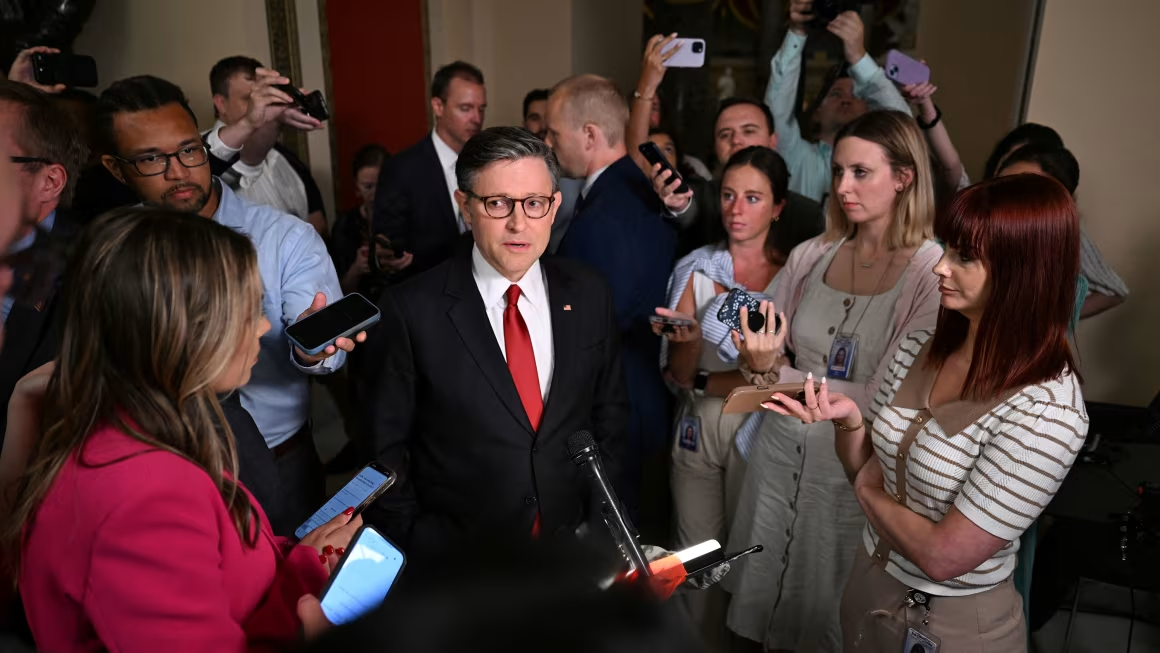A dramatic showdown is unfolding in the House of Representatives, as President Donald Trump and Speaker Mike Johnson attempt to rally Republican lawmakers behind a sweeping domestic policy package. The bill, already passed by the Senate, faces a critical procedural vote in the House that remained open overnight amid deep divisions within the GOP.
Speaker Johnson has vowed to keep the vote open “as long as it takes,” as party leaders scramble to secure the support of nearly a dozen Republican holdouts. If successful, the House will proceed to a final vote on the legislation. If not, GOP leadership would be forced to rework their strategy in a major political setback.
A number of House Republicans are—at least for now—blocking what could be Trump’s first major legislative victory of his second term. For weeks, Trump and his team have assured congressional leaders they could win over conservative hardliners who have resisted aspects of the package, according to three people familiar with the discussions.
Now, with time running out, the president and top aides are in a full-court press. Groups of GOP lawmakers have been summoned to the White House for private meetings to express concerns about the Senate-passed version of the bill. Speaker Johnson is simultaneously working to unify a fractious caucus that remains torn between ideological purists and pragmatic centrists.
In one such session, described by a GOP attendee as “cordial,” Trump addressed members directly. The White House also brought in Dr. Mehmet Oz, who now leads the agency overseeing Medicaid, to explain key provisions, including those involving provider taxes and increased support for rural hospitals. Vice President JD Vance joined Trump at the meeting.
“Those meetings are having a big impact, members are moving to yes,” Rep. Dusty Johnson (R-SD) told reporters after the meeting.
House Majority Whip Steve Scalise emphasized Trump’s influence, saying, “The president from day one has been our best closer, and he’s going to continue to be through today.”
Both Trump and Johnson have been clear: they want the bill signed into law by July 4. With a narrow Republican majority, the House can only afford to lose three GOP votes if all members are present—leaving no margin for error.
The legislation, passed Tuesday in the Senate by a 51-50 vote with Vice President Vance casting the tie-breaking vote, includes a broad extension of Trump-era tax cuts, boosts to border security and defense spending, and controversial cuts to Medicaid and food assistance. It also repeals taxes on tips and overtime pay—campaign promises Trump is eager to deliver.
Still, not all Republicans are on board. Some conservatives are demanding changes to the Senate’s version, which GOP leaders have refused to make. “It’s not ‘take it or leave it.’ I don’t need take it or leave it legislating,” said Rep. Chip Roy (R-TX). “How about we send it back to him. We say, ‘Take it or leave it,’ all right? So the Senate doesn’t get to be the final say on everything. We need more spending restraint.”
Tensions have also flared over the political risks the bill poses. Some Republicans worry the spending cuts could be used against them in the 2026 midterms. In a dramatic turn over the weekend, Sen. Thom Tillis (R-NC)—who defied Trump by voting against the bill—announced he would not seek re-election, just one day after Trump threatened to support a primary challenger.
Despite the turbulence, House leadership remains confident. Multiple sources say GOP leaders believe they have the votes to push the legislation through, though final passage will require heavy political lifting.
For Trump, the bill represents a defining opportunity to solidify his second-term agenda and reshape U.S. domestic policy. Whether or not it clears the House this week will determine if he succeeds—or faces a major legislative defeat early in his renewed presidency.






